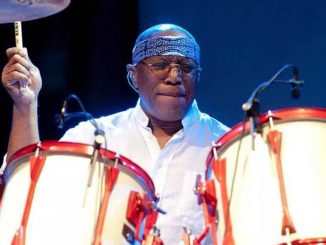As the BBC 6 Music festival begins, broadcaster and DJ Gilles Peterson looks at why Bristol has produced such a wealth of underground sounds

BBC Radio 6 Music decamps to Bristol this weekend for its third 6 Music festival. It’s a city with a fantastic musical heritage, one that perfectly encapsulates the alternative spirit that is the station’s beating heart.
For my regular Saturday afternoon 6 Music show, I recently took a day trip out west to find out more about the history of Bristol’s underground music scene, tracing the influence of reggae and dub to post-punk, electro, hip-hop, trip-hop, jungle, drum’n’bass and dubstep, right through to today’s bass music. The city has produced fascinating musical acts beyond this continuum, but for me, the sounds that have emerged through Bristol’s omnipresent sound-system culture are the most exciting.
I have a personal connection with Bristol that stretches back to the mid-80s, just as my DJing career was getting started. I got one of my first bookings outside London playing the Thekla (a boat that’s still moored in Bristol’s docks), and meeting many kindred spirits that evening, including Grant Marshall, who would later become Daddy G of Massive Attack, confirmed to me that the city’s music scene was unique
But before my experiences of the city, music had long played a crucial role for the inhabitants of Bristol, as I heard from speaking with Jabulani of Black Roots, a Bristol reggae band who formed in 1979. I learned about the city’s slave-town history, which brought in a large Caribbean community, and how through music Jabulani and his bandmates were able to confront lack of opportunities and isolation, providing an outlet for their creativity, as well as an unexpected career path.
A new discovery for me on my visit to Bristol was the post-punk vigour of Mark Stewart from the Pop Group. A larger than life character, he was empowered by the DIY punk aesthetic of the Clash and the free-jazz of Sun Ra while growing up as a sound-boy in St Paul’s. By combining punk and jazz with the reggae influences heard on the local sound systems and dub imports in the city’s many record shops, the Pop Group produced a unique post-punk sound that would take them to New York, Tokyo and beyond.
As a side note, Bristol still brims with quality record shops, such as underground specialists Idle Hands, the Centre for Better Grooves (where I found a pre-release copy of the Pop Group’s debut album, with cover letter and in-sleeve photography intact), as well as Rise and John Stapleton’s Wanted Records. The legendary Revolver is now defunct, but during the trip I had the opportunity to talk with Richard King, ex-employee of the store and author of Original Rockers, about the shop’s history, and hear about Revolver’s role in the city’s musical development.

In attempting to describe what created Bristol’s sound, King recalled the stop and search or “sus” law, which, alongside other factors, led to the St Paul’s riot in 1980 and was repealed in 1981. Partly as a result of this disturbance, new rules were introduced that allowed the St Paul’s community to self-police. The sound systems were then free to continue all night, with rolling bass lines undulating through to daybreak. Economic difficulties of the time meant there were plenty of empty buildings in which to throw parties, so unlike other cities that had strictly regulated hours, Bristol incubated an all-night sound-system culture that was free to develop organically and without restriction. For King, that late-late-night vibe of a darkened dance floor is central to the Bristol sound.
With the arrival of US electro and early hip-hop imports in the early 80s, together with an increasingly racially integrated community, the Bristol sound-systems became more and more eclectic. The emergence of the Wild Bunch sound systemwould soon birth Massive Attack, who, alongside Portishead, would ensure global trip-hop domination throughout the 90s and beyond. Visiting Geoff Barrow (of Portishead and Beak) at his central Bristol Invada Studios, he explained that the city’s size might also contribute to the eclecticism of Bristol music. Bristol is simply not big enough for bands of different scenes to stay sheltered within their own niches, and so influences are shared and perspectives altered.
Before catching the train back to London, I managed to fit in a final visit with an old friend, drum-and-bass icon Roni Size who – alongside DJ Krust – presents Full Cycle at the 6 Music festival. Appropriately, he lives a stone’s throw from Jabulani’s front door in St Andrews, where I’d started the day. This acted as a useful reminder of how interconnected the Bristol scene is; many generations, all bound by a shared sound-system upbringing, infused with that punk DIY attitude … each left to discover their own musical paths, rising up from the fertile Bristolian soil. It’s a small city with a huge musical legacy.
- The 6 Music festival in Bristol is from 12-14 February. Gilles Peterson’s show is Saturdays, 3-6pm on BBC Radio 6 Music.
Via the Guardian
Find Massive Attack vinyl, CDs, promos and more at eil.com – to see full list click here



Be the first to comment